About Only Fools And Horses
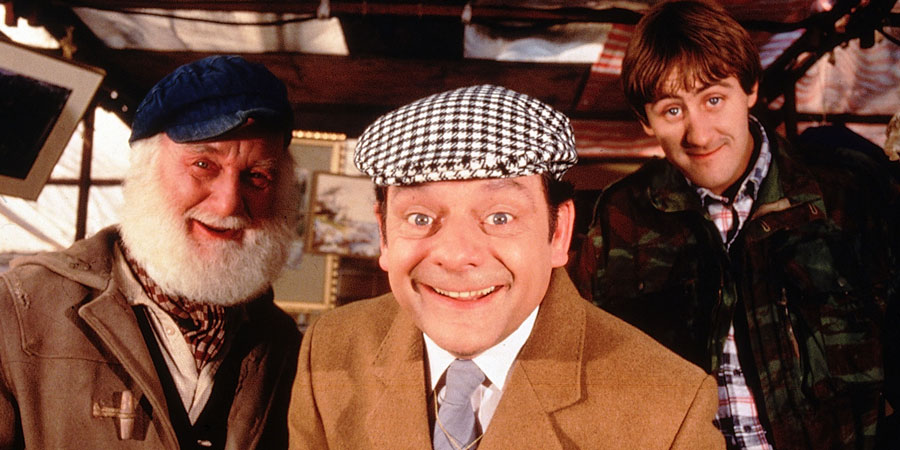
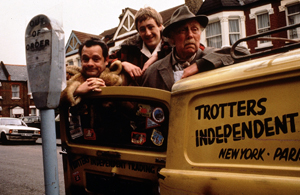
Only Fools And Horses, named Britain's Best Sitcom in a 2004 poll, follows the lives of Derek, Rodney, Edward and later Albert Trotter, as they duck and dive through life, barely managing to scrape a living. Occasionally friends such as shady car dealer Boycie, the easily led Denzil, dopey Trigger or barman Mike became involved, often against their will, in Del's dodgy and not infrequently dangerous schemes.
Market traders, the Trotters conduct their unregistered business under the banner of Trotters Independent Trading Co (or Trotters Independent Traders - TIT - for short), operating out of a knackered, grubby, once-yellow three-wheel Reliant Regal Supervan. They live in a high-rise, Nelson Mandela House, on a Peckham council estate.
Background
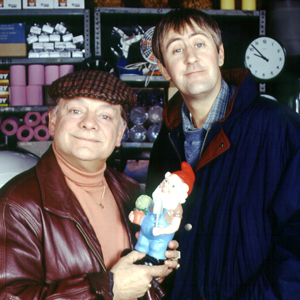
Writer John Sullivan, from Balham in south London, had spent his youth in a variety of low-paid jobs before having his first work (Citizen Smith) commissioned whilst working as a scene-shifter at the BBC. Notably, he'd spent time as a market trader, and when Citizen Smith came to an end in 1980, he was asked to develop further series ideas: Only Fools And Horses was born.
Originally titled Readies, producer Ray Butt signed up Nicholas Lyndhurst as Rodney first. Lennard Pearce was soon found for the part of Grandad, but the central character of Del Boy was more problematic. Jim Broadbent was offered the part, but declined due to existing commitments (he would later play DCI Roy Slater). Enn Reitel was also considered for the role, but it was not until Butt saw David Jason in an Open All Hours repeat that he was considered. For fans of the show, it's hard to picture the part being played by anyone else, but Sullivan was initially unhappy with the casting: it was only upon seeing Jason's interpretation of the character during a read-through that his fears were allayed.
Reception
The programme's position as one of the nation's favourite TV shows is a world away from its humble beginnings. The first two series failed to attract much interest or acclaim, achieving what were for the time only mediocre ratings - so weak, in fact, that the series was almost cancelled by the BBC. However, word of the series began to spread during repeats, and the show was soon attracting huge audiences: a third series was swiftly commissioned.
Ever since, the series has enjoyed sizeable viewing figures. A British television ratings record was set in 1996 when more than 24 million people tuned in for the third of the Christmas specials, Time On Our Hands. The following episode, 2001's If They Could See Us Now!, attracted more than 20 million people to their TV screens, a figure not bettered by any other television programme that decade.
Unlike many of Britain's other big-name sitcoms however, Only Fools And Horses has achieved mixed reception abroad. The show has enjoyed success in many European and former Soviet countries, including Greece, Spain, Montenegro, and Portugal, where the series was remade as O Fura-Vidas, but struggled in other territories: in the USA, for example, the series remains a cult hit but failed to become a mainstream success in the manner that so many other British sitcoms had. Reportedly, Americans had so much trouble understanding the language used in the series that some episodes were subtitled.
Series Development
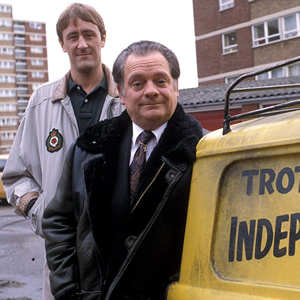
Only Fools And Horses is an interesting study in the evolution of the sitcom. The initial series follow a similar format to many others: isolated episodes that can be viewed in almost any order. We learn more about the characters and their complex back-stories with each episode, but their lives do make no progression. The first change to the formula was enforced: in December 1984, early during the production of Series 4, Lennard Pearce suddenly died after suffering a series of heart attacks. As we now know, Buster Merryfield was cast as Edward 'Grandad' Trotter's brother, Albert; the few location scenes with Pearce that were already completed were re-filmed with Merryfield: he continued in the series until his own death in 1999.
From here, Sullivan begins to develop the show. No longer is each episode entirely throw-away: longer episodes are produced, and he begins subtly linking characters, ideas, and Del's dodgy dealings back to what had happened - in some cases - years previously. Slowly, the characters themselves shift. Notably, Del and Rodney began to settle down with respective partners, but both experienced problems: Rodney, who married the bright Cassandra, became intimidated by her career and friends, and they suffered the emotional trauma of a miscarriage; Del endured a volatile relationship with Raquel, an aspiring actress who, when they met, was moonlighting as a stripagram. Eventually, Del and Raquel cemented their relationship with the birth of a baby.
By this time, the show had moved on from its initial premise of the two roguish but likeable brothers, to cover wider themes. It also kept pace with real events and social trends: as the 1980s episodes progress, Del becomes more of a yuppie, trying not just to scrape a living but to actively improve his lot and move up in society. This move naturally encompassed wider themes, from marital breakdown to miscarriage and the struggle to conceive at all. But whilst there are dark, sad and often moving moments in the show, viewers are safe in the knowledge that an uplifiting scene is never far away.
The End
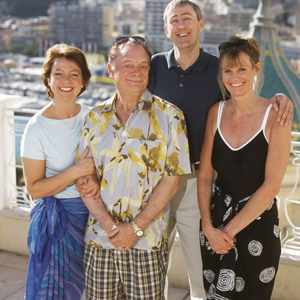
In 1996, the BBC announced that the series would come to a final close. It would end with a bang, in the shape of three hour-long ratings-smashing episodes that reunited Raquel with her long-lost parents and culminated in a glorious triumph for Del and Rodney when an antique watch Del has had hanging around for years turns out to be a rarity of enormous historical value. It sells at auction in London for more than £6 million, and the Trotters finally achieve their aim of becoming millionaires.
However, it wasn't long before rumours began to circulate that Sullivan might bring the Trotters out of retirement for a millennium special. Although this didn't happen, in 2001 it was announced that the show would return for three multi-million pound special episodes. The first was broadcast on Christmas Day that year.
With both Buster Merryfield (Albert) and Kenneth MacDonald (Mike) having recently passed away, their characters were written out - Uncle Albert was said to have died peacefully on the coast whilst publican Mike was ensconced in jail - but all the other regulars were back on board to find that, owing to some unfortunate stock market investments in South America, the Trotters had lost their fortune. The specials played out on successive Christmas Days, finally closing in 2003 with Sleepless In Peckham, in which the brothers faced huge demands from the Inland Revenue, and Rodney and Cassandra finally had the baby they'd been longing for.

